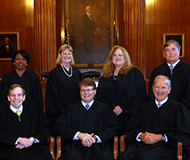8/24/2017
North Carolina Supreme Court Upholds Stopping Drivers Without A ViolationDriving safely within your lane can still result in a traffic stop, the North Carolina Supreme Court ruled last week.

Police in North Carolina can pull over motorists even if they have committed no traffic violation. The state's highest court on Friday approved the stop of a man whose pickup truck fishtailed slightly while making a left-hand turn on a snowy road.
The North Carolina Court of Appeals had reviewed the case and found the driver, James L. Johnson, had done absolutely nothing illegal. The unanimous three-judge panel struck down the traffic stop as unconstitutional, but the high court justices last week insisted on declaring the officer's actions as legitimate, reversing the lower court's decision.
On February 16, 2013, Hendersonville Police Officer Garrett Gardin was irritated when he pulled up to an intersection and heard Johnson blaring "really loud" music and revving the engine on his truck. When the light turned green, Johnson hit the gas, turning left while fishtailing slightly. At all times, Johnson maintained his proper position within the lane, stopping cleanly and safely at the next intersection after the light turned red. Officer Gardin decided to give him a ticket anyway, and the high court only considered whether this choice was legitimate.
"Here, Officer Gardin thought that defendant was driving at an unsafe speed given the weather and the conditions of the road," Chief Justice Mark D. Martin wrote for the Supreme Court. "As long as Officer Gardin reasonably believed, and had some minimal level of objective justification to believe, that defendant had just driven at a speed that was greater than was reasonable and prudent for the snowy and slushy conditions that Officer Gardin was observing, then the reasonable suspicion standard was met."
The justices reasoned Johnson must have been violating the law against driving too fast for the conditions because light snowflakes had begun to fall when the incident took place. The justices attributed Johnson's ability to maintain his lane position to "sheer good fortune."
"It is common knowledge that drivers must drive more slowly when it is snowing, because it is easier to lose control of a vehicle on snowy roads than on clear ones," Justice Martin wrote. "And any time that a driver loses control of his vehicle, he is in danger of damaging that vehicle or other vehicles, and of injuring himself or others."
A copy of the ruling is available in a 120k PDF file at the source link below.


